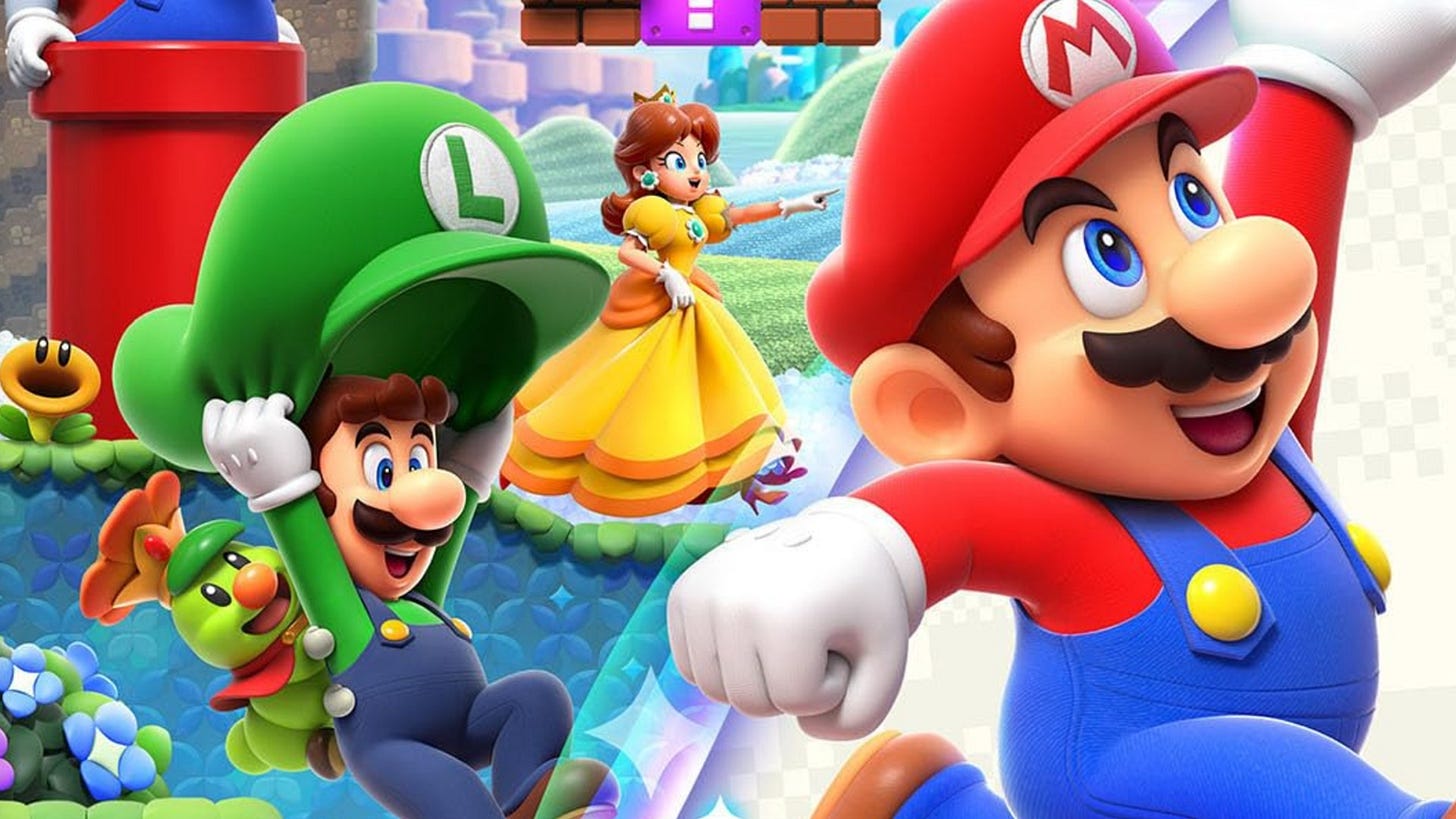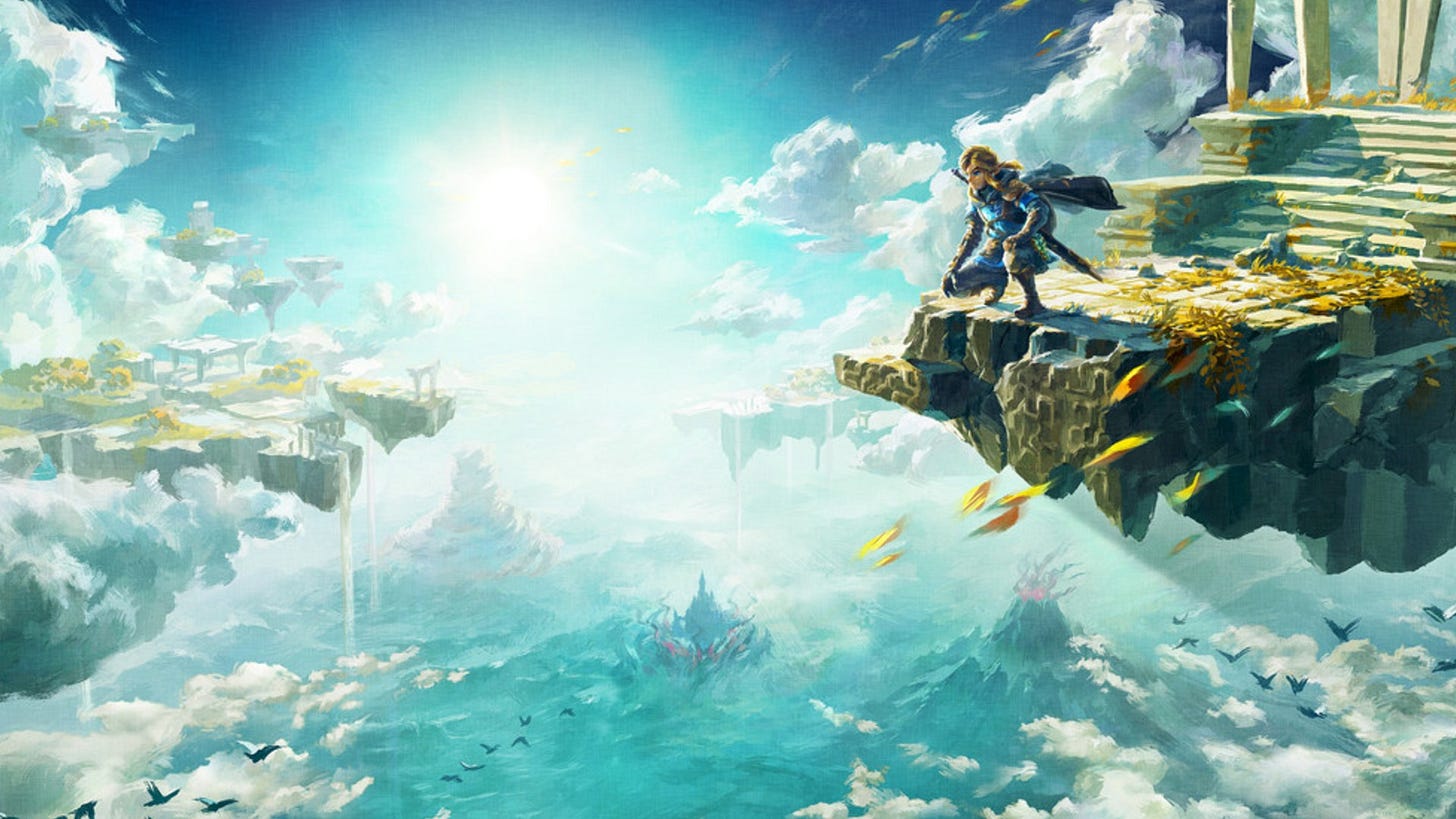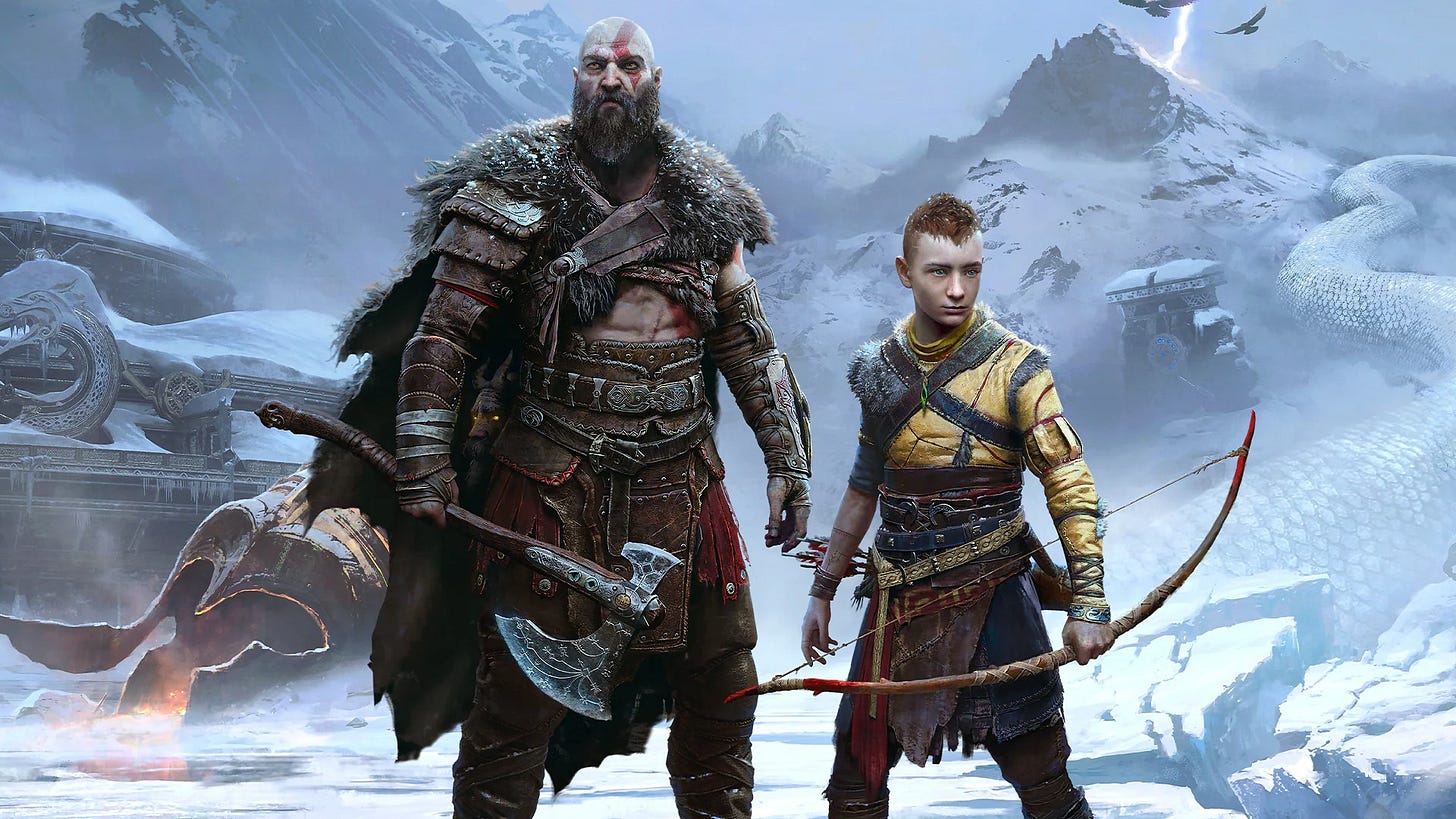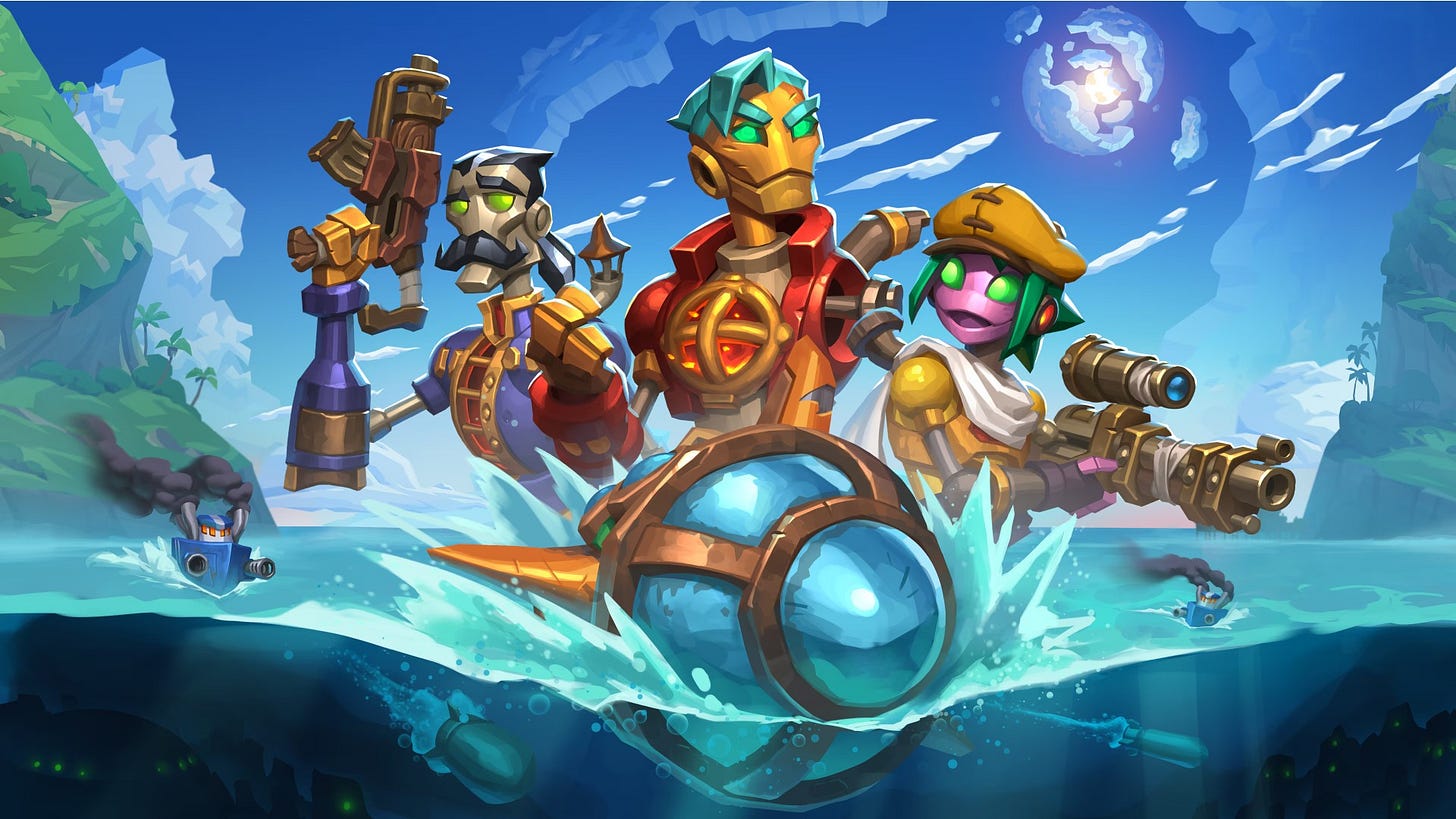What Video Game Series Pass the Five-Games Test?
Take your seats, Mario, Zelda, Final Fantasy, God of War, and SteamWorld.
Back in 2011, music journalist Steven Hyden sought to reinvent the way we measure the success of a particular band or artist. You see, traditionally, music acts would be judged by either their commercial success (how many albums or singles have they sold) and/or their critical success (how strong are the reviews for said albums and singles). Hyden introduced a third method: the five-albums test.
The five-albums test goes like this: the greatness of a band or artist can be judged by whether or not they have a run of at least five consecutive studio albums that are generally considered great-to-outstanding. As such, the five-albums test is more concerned with consistency and longevity in a band’s recording career than sales or mercurial critical reception.
For this reason, most people would accept that The Beatles pass the five-albums test with a stunning five-album run that stretches from Rubber Soul (1965) to Abbey Road (1969)1. On the other hand, it’s hard to argue that The Beach Boys stack up according to this metric. The boys from Hawthorne, California occasionally strung together a couple of terrific albums, but would consistently break the streak with an LP that was either just fine or genuinely subpar.
Like any measure of success, the five-albums test is far from perfect—something even Hyden acknowledges in his original article. It fails to account for how well a band or artist performs their music live, is unfair to any group that released fewer than five studio albums (such as Nirvana), and its definition of what is considered a good enough work to keep the five-album run alive is naturally subjective and therefore dubious at best.
Still, I find the test to be a fun, novel lens through which to examine the sustained quality of my favourite music acts. If nothing else, it gives me yet another excuse to mull over ultimately pointless questions, like: does Taylor Swift pass the five-albums test (she doesn’t) or does Stevie Wonder have the greatest five-album streak of all time (he does: 1972’s Music of My Mind to 1976’s Songs in the Key of Life ).
You already know where this is going.
Introducing the five-games test! Yep, I’m shamelessly stealing Hyden’s original concept and applying it to the world of gaming. Because the only thing more entertaining than watching music nerds battle it out over which band qualifies for this rubric is gamer nerds doing the same for their favourite video game series. Unleash the fanboys!
But in all seriousness, I think it will be interesting to dig into a handful of iconic and beloved video game series to see which ones have a consecutive run of five or more great games, and which ones don’t. Video games are so tricky to bring to life, it’s a minor miracle any exist at all. Studios must overcome countless technical, financial, and creative hurdles simply to develop a single high quality game. For a series to have five or more very good games in a row is a monumental achievement that I believe deserves to be recognised and celebrated.
But first, some ground rules/extremely pedantic caveats for how I’m measuring the five-games test:
1. I will try my best to explain what games I consider to be part of a series when I get to discussing that particular series. Spoilers: this gets messy. Video game series don’t follow the same relatively neat lines of a musical artist’s discography. When you start considering spinoff games, handheld/mobile entries, and DLC, defining what games make up a series becomes increasingly murky. As I said, I will try my best to explain my reasoning for each series—but just know that I haven’t gerrymandered any list of games to suit a specific narrative.
2. Steven Hyden loosely defined the albums that would qualify for being part of the five-albums test as being of a B+ quality or higher. What does this mean? Who can really say? For the five-games test, I will be taking a number of factors into account when considering the overall quality of a game. This includes critics’ reviews, overall fan sentiment, historical context, retrospective opinions, and yes, even a dash of personal bias. Fundamentally, this is a subjective experiment. Just because a game has a strong Metacritic score, doesn’t automatically qualify it for inclusion in a five-game run if most of that series’ fans were disappointed by the work. The opposite is also true. To the best of my ability, I will try to balance all of these variables when discussing each game/series.
3. And finally—and I really, really want you to pay attention to this one—none of this actually matters. This is just a fun little thought experiment I wanted to try out on some of my favourite video game series and create some content around it. The five-games test is not scientific and should not be the catalyst for whether your day is ruined or not. Just because a series fails to pass the five-games test (within the ridiculously arbitrary criteria I have set), does not mean it is a failure overall. There are countless ways to judge the worth of a video game series, and the only one that really matters is whether those games bring you joy. This article is just for fun. So let’s have some fun!
I’ve picked out five video game series to trial against the five-games test, so let’s see how they each hold up under examination.
Super Mario
Immediately we run into our first problem with the five-games test. Because what do you consider to be a Super Mario game? This is a question as old as time (or, at least the 80s) and one I don’t have the word count to properly address today. YouTuber jan Misali made a forty-six-minute video trying to answer this question—with the consensus being there isn’t any consensus.
This is bad news for the five-games test. Before we can find a possible streak of five games, we first need to establish a list of games that most people agree to be representative of the Super Mario series. To peel off the band aid: such a list does not exist. So to simplify everything and avoid any further waffling, I am choosing to base this test on the list of games featured under the Main Titles section of the Super Mario (Series) page on the Super Mario Wiki. I find this list aligns with my perception of what constitutes the mainline series of Super Mario platformers. If your personal list does not align with this one, feel free to write out your own list and apply the five-games test using that.
The good news is that, based on this list, Super Mario passes the five-games test with flying colours (those colours likely being red and blue). Here’s the longest streak of Super Mario games that are generally considered to be of a very strong quality:
1. Super Mario World (1990)
2. Super Mario Land 2: Six Golden Coins (1992)
3. Super Mario 64 (1996)
4. Super Mario Sunshine (2002)
5. New Super Mario Bros. (2006)
6. Super Mario Galaxy (2007)
7. New Super Mario Bros. Wii (2009)
8. Super Mario Galaxy 2 (2010)
9. Super Mario 3D Land (2011)
As you can see, this run of nine games far exceeds the five-game qualification for the test to be a success. At either end of this particular list are two handheld Super Mario games that, while considered perfectly fine in their own right, rarely get spoken of in glowing terms—those being 1989’s Super Mario Land and 2012’s New Super Mario Bros. 2.
Some may raise their eyebrows at certain games in this streak—notably, Super Mario Sunshine and the pair of New Super Mario Bros. games. However, while I acknowledge those games don’t receive the same universal level of praise as others, I do believe their inclusion is valid given the ever-growing positivity felt towards them as the regular cycles of nostalgia take effect. Besides, all three games did also receive glowing reviews at launch, further validating their inclusion.
Does Super Mario pass the five-games test?
Absolutely.
The Legend of Zelda
It is significantly easier to determine what games belong in The Legend of Zelda series, but to avoid any unnecessary confusion, I will once again be consulting the series’ wiki for the purpose of this test. However, it is important to note that I will not be counting any re-releases of games—be they DX, 3D, HD, or otherwise. That gives us a list of twenty-one games to work with, ranging from the original The Legend of Zelda in 1986 to last year’s Echoes of Wisdom.
I think the best way to approach this series is to first discuss the games that would break a streak. Again, if any of these games are your favourite Zelda, then great! I really like some of these games as well, but I cannot in good faith include them in a five-game run for the following reasons:
· Zelda II: The Adventure of Link (1987) – too obtuse, difficult, and antithetical to the original game to be a great of the series.
· Four Swords (2002) – a fun, but brief experiment that many don’t consider to be a mainline Zelda game. However, I will be accepting its inclusion given its appearance on the wiki’s list.
· Phantom Hourglass (2007) and Spirit Tracks (2009) – the two DS Zeldas definitely have their fans (myself being one of them), but the touch-only controls, frustrating dungeon design, and odd modes of traversal were a turn-off for many.
· Tri-force Heroes (2015) – can be a lot of fun, but only if you’ve got two friends willing to play with you.
So, with that out of the way, is there a streak of five or more great Zelda games in a row? Yes, yes there is:
1. A Link to the Past (1991)
2. Link’s Awakening (1993)
3. Ocarina of Time (1998)
4. Majora’s Mask (2000)
5. Oracle of Ages (2001)
6. Oracle of Seasons (2001)
Annoyingly, this run could have been extended to seven games had The Wind Waker released a mere twelve days earlier to just sneak in front of Four Swords. And, if you are one of those people who doesn’t consider Four Swords to be a core entry in the Zelda series, then you could argue this run would continue all the way to Twilight Princess—bringing the total count to ten terrific games in a row.
Does The Legend of Zelda pass the five-games test?
Yes, but it could potentially be even longer.
Final Fantasy
The problem is Final Fantasy VIII.
Okay, let’s backtrack for a minute. To keep this test as simple as possible, I am only considering the sixteen numbered Final Fantasy games in their original forms. No sequels. No spinoffs. No remakes. And certainly no sequels or spinoffs of the remakes or remakes of the spinoffs or sequels or spinoffs of the sequels or… you get the idea.
I have zero qualms asserting that Final Fantasy II, III, and XIII are streak-breakers. If you want to argue that II’s characters or III’s dungeons or XIII’s level designs are actually misunderstood and underrated, then I look forward to reading your articles on the topics. Like, genuinely, I’d read those in a heartbeat.
Here’s why the real problem child is the eighth numbered game in the series. Let’s take a look at what most would consider to be mainline Final Fantasy’s best run:
1. Final Fantasy IV (1991)
2. Final Fantasy V (1992)
3. Final Fantasy VI (1994)
4. Final Fantasy VII (1997)
5. Final Fantasy VIII (1999)
6. Final Fantasy IX (2000)
7. Final Fantasy X (2001)
8. Final Fantasy XI (2002)
9. Final Fantasy XII (2006)
Final Fantasy VIII sits right in the middle of this possible nine-game run, with a pair of four-game streaks either side of it which, while inarguably strong, are ultimately futile for the sake of this test. To put it plainly: Final Fantasy’s success at the five-games test hinges entirely on whether you consider Final Fantasy VIII deserving enough to be included. Final Fantasy VIII is the missing link, but it’s a wobbly one at best.
Since its launch, Final Fantasy VIII has divided fans over its quality. While most would concede the game has some of the best music and art direction in the series, many found its lead characters overly moody and its Draw & Junction magic system compelling but poorly executed. Given the game occupies a steady place towards the bottom of most Final Fantasy rankings—along with the other streak-breaking titles I mentioned earlier—I unfortunately cannot give this legendary JRPG series a pass mark on the five-games test.
Does Final Fantasy pass the five-games test?
No, but it has two of the best four-game runs we’ve ever seen.
God of War
Sony enters the five-games test with one of its flagship series. And at first glance, you would expect God of War to tear through this test as easily as the Blades of Chaos slicing through the cornea of a cyclops’s eye (sorry, that got graphic). While reception is generally muted towards God of War: Ascension (2013), that still gives us a clear run of five highly-regarded games during the series’ Greek era:
1. God of War (2005)
2. God of War II (2007)
3. God of War: Chains of Olympus (2008)
4. God of War III (2010)
5. God of War: Ghost of Sparta (2010)
This means God of War easily passes the five-games test, right? Not quite. We’re forgetting the 2007 Java mobile phone game, God of War: Betrayal.
For those who haven’t heard of this game—which is completely fair given its relative obscurity and almost complete inaccessibility in 2025—God of War: Betrayal translates the hack-n-slash gameplay of the series to a 2D side-scrolling format, with a story that takes place between the first and second God of War. Like many mobile games in the pre-smartphone era, God of War: Betrayal is simple, short, and has never seen an official re-release from Sony.
But it’s still a canonical God of War game. And if I included Four Swords as an official mainline Zelda game, then I have to do the same with God of War: Betrayal in this series. And while the game did review well when it released, few continue to sing its praises after all these years. Given it dropped between the releases of God of War II and Chains of Olympus, this sadly means that God of War has lost all hope of passing the five-games test (at least, for now).
Does God of War pass the five-games test?
No, so long as you consider God of War: Betrayal a mainline game.
SteamWorld
Here’s an interesting one! After the cute but unremarkable SteamWorld Tower Defence in 2010, the SteamWorld series has sustained a consistently excellent run of games starting with 2012’s SteamWorld Dig. This is especially impressive given the series’ indie roots and the diversity of genres it has tackled across entries—from turn-based tactical shooters to deck-building RPGs. Put simply, SteamWorld games are always hyper polished, mechanically interesting titles that are bound together by a common aesthetic and humorous writing.
Does this mean SteamWorld passes the five-games test? Well… what I said about the series maintaining “a consistently excellent run of games” isn’t entirely true. After a solid four-game run that lasted from SteamWorld Dig (2012) to SteamWorld Quest (2019), the series attempted the city-building genre with 2023’s SteamWorld Build. This was the first SteamWorld game in a while to receive a more mixed reception. Certainly not bad, but SteamWorld Build undoubetdly received a cooler response than what the series is used to.
I still really enjoyed the game and thought it was in step with the usual quality I expect from a SteamWorld game, and many would agree with me. But is that enough for the series to pass the five-games test? I’m unsure on this one. Further testing may be required.
Does SteamWorld pass the five-games test?
Maybe… depending on how you judge SteamWorld Build. But, also, probably not.
Thanks for reading this week’s different kind of article! Hope you had some fun along the way 😊
What video games series do you think pass the five-games test? Why is Super Mario Run secretly the best game in the series? Let me know in the comments!
The Video Game Storyteller is a free Substack written and formatted by Harry Fritsch on the lands of the Jagera and Turrbal people, the Traditional Custodians of Meanjin (Brisbane).
All images were either captured directly by the author or sourced from publicly available promotional screenshots.
Want to see more from The Video Game Storyteller? Check out our TikTok channel @thevgstoryteller or follow our Bluesky @thevgstoryteller.bsky.social
If you wish to contact Harry, you may do so by emailing him at harryfritsch98@gmail.com.
This is assuming you don’t count the glorified EP Magical Mystery Tour (1967) or the soundtrack album Yellow Submarine (1968)—which I see as existing outside of The Beatles’ core studio album discography.











Really great concept for an article and I agree with all your picks from the series that I’ve played here
Also came to a horrible realisation that my favourite series: Metal Gear Solid probably doesn’t pass the test. 1 - 3 are universally beloved, MGS4 is a hot mess but still enjoyable and MGS5 is quite divisive.
Hmm. GTA has had a pretty good run for itself. GTA III, Vice City, San Andreas, GTA IV, and GTA V were all really well received I’d say haha!